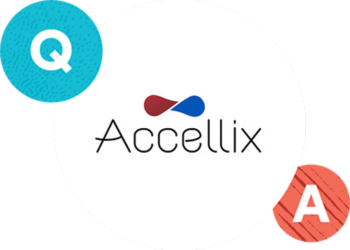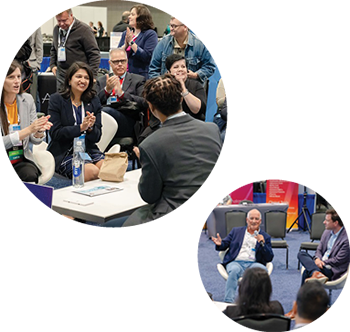
AABB interviewed Félix Alejandro Montero Julian, PhD, vice president of scientific affairs at Accellix, a participating organization in the Biotherapies Pavilion at the 2025 AABB Annual Meeting. Read the interview below to learn more about the Accellix team.
My name is Félix Alejandro Montero Julian. I was born in Mexico and earned my bachelor of science degree in industrial biochemistry engineering from the Universidad Autónoma Metropolitana. I then moved to France to pursue a PhD in immunology. I'm currently based in the United States, travelling regularly between San Diego and San Jose, Calif. I joined Accellix in July of this year as vice president of scientific affairs and am fortunate to be working with a great team.
At Accellix, our mission is to transform the way immunophenotyping quality control and cellular starting material characterization are performed in the cell therapy and blood collection industries. We want to make complex cellular analysis something that's accessible, standardized and truly point-of-use.
By automating and simplifying flow cytometry, we're working to become the new gold standard for cellular testing, helping our partners save time, reduce variability and ensure that critical quality attributes are consistently and reliably measured. Our work supports one clear goal: to help bring life-saving cell and gene therapies to patients faster and with greater confidence.
Today, Accellix is a growing international team of about 70 professionals, bringing together experts in flow cytometry, engineering, assay development, software, manufacturing, commercialization and regulatory science. We're all united by the same purpose: making advanced cellular analytics simple, reliable and ready for the real world.
Our flagship product is the Accellix Platform, a compact, easy-to-use, automated flow cytometer designed for cellular analysis in blood collection and cell therapy development and manufacturing QC environments. This device delivers multiparameter immunophenotyping and viability assays with minimal training requirements, small sample volumes and rapid turnaround times. We also offer a selection of standard, off-the-shelf assays, including lymphocyte subset assays and T cell subset assays, in addition to the core instrument. These cartridge-based assays include room-temperature-stable dried reagents and internal control beads for cell counting and in-run quality control, ensuring reproducible results with minimal operator intervention. Custom assays are also available, tailored to specific cell therapy manufacturing workflows, including starting material characterization, in-process testing and drug-release testing. These assays are developed in close collaboration with customers to meet their unique analytical and regulatory needs.
Proprietary, algorithm-based data analysis and reporting software automatically classifies cell subsets and extracts critical quality attributes in real-time. This allows users to make informed decisions immediately at the point of testing, supporting process control and comparability. Together, these components make the Accellix Platform a comprehensive analytical solution that brings flow cytometry out of the core lab and directly into the blood collection or cell therapy manufacturing environment.
One of our biggest challenges has been bridging the gap between traditional flow cytometry and the needs of modern, regulated manufacturing environments. Flow cytometry is a powerful analytical tool, but it has historically been complex, highly manual and dependent on expert operators, which does not align easily with the GMP and real-time demands of cell therapy production.
At Accellix, we set out to make this technology simpler and standardized, without compromising scientific rigor. Achieving that required rethinking everything, from reagent stability and microfluidic design to automated gating algorithms and data integrity systems. Another challenge has been driving industry adoption. Introducing a disruptive approach in a field as highly regulated as cell therapy manufacturing requires not only technological excellence but also strong validation data, regulatory alignment and trust-building with our partners.
Throughout the past five years, we have made tremendous progress, expanding our assay portfolio, strengthening collaborations with key industry leaders and associations like AABB and ISCT, and demonstrating that automation and standardization can coexist with precision and compliance. Those early challenges have definitively shaped the strong foundation we stand on today.

Our primary goal is to make the Accellix Platform as accessible as possible to cell and gene therapy developers, manufacturers and blood collection centers worldwide. The Accellix team is focused on continuing to expand our assay selection, including panels designed for cellular starting material characterization, as well as in-process and release testing for cell therapy. We continue to broaden our partnerships and collaborations with leading advanced therapies developers and industry organizations in order to achieve that goal. Our message is that automation, standardization, and real-time data analysis can fundamentally improve process consistency, product quality and regulatory compliance.
Looking ahead, our vision is to make Accellix a trusted analytical standard, one that helps our partners scale manufacturing, accelerate release and bring transformative therapies to more patients more quickly.
I am most excited to see how the field is embracing automation, digitalization and standardization to bring true control and predictability to cell therapy manufacturing. We are entering a new era where analytical technologies like Accellix are not just supporting QC; they are becoming an integral part of real-time process understanding. It is incredibly rewarding to witness how automated, on-site flow cytometry can help manufacturers make faster, data-driven decisions, reduce variability and link starting material quality directly to product potency. This convergence of analytical precision and process intelligence is what will truly enable the scalability of cell and gene therapies.
Beyond the technology itself, I am excited by the growing sense of collaboration across industry, regulatory agencies and associations like AABB and ISCT, all working together to build a more standardized, efficient and patient-centered ecosystem.
Our collaboration with AABB began very naturally, as both organizations share a common mission to advance the quality, safety and standardization of blood and cellular therapies. Accellix recognized early on that blood centers play a pivotal role in the success of life-saving cell and gene therapies, as they provide the critical cellular starting materials that define the quality of therapeutic product.
Partnering with AABB provided an ideal platform to engage directly with experts in blood collection, processing and cellular characterization, and to contribute to the broader dialogue around analytical innovation in this space. Our initial interactions began through the AABB Biotherapies Pavilion at the AABB Annual Meeting, with scientific presentations and working group participation, where we shared data on how automated flow cytometry can enhance cellular starting material characterization and in-process quality control.
This engagement quickly evolved into deeper collaborations with American Red Cross Cell and Gene Therapy Solutions and the BCA Advanced Therapies Network, with AABB providing valuable opportunities for us to exchange insights, align with industry standards and support the community in adopting simpler, more robust analytical workflows. Today, those partnerships continue to strengthen as we work together toward a shared goal: delivering reliable, standardized testing at the point of collection, elevating leukopaks into well-characterized cellular starting material for cell therapy, and ultimately improving manufacturing efficiency and patient outcomes.
AABB plays a critical role as a unifying force in the biotherapies ecosystem. Its unique position, connecting and fostering dialogue between blood centers, cell therapy developers, clinicians, regulatory experts and technology innovators, creates the ideal environment for advancing quality, safety and standardization across the entire advanced therapies field.
For companies like Accellix, AABB provides an invaluable platform for scientific exchange and collaboration. Through its conferences, working groups and standards initiatives, AABB helps align the community on best practices for patient and donor collections, cellular starting material characterization and process control, areas that are fundamental to successful downstream cell and gene therapy manufacturing. We view AABB as a true partner in progress, accelerating the adoption of new analytical technologies, such as Accellix, that can simplify workflows, ensure data integrity and help bring advanced therapies to patients more efficiently and safely.

I believe the next major development in the biotherapies field will be the integration of real-time analytics and digital process control into manufacturing, which many now refer to as the move toward "smart manufacturing" or data-driven bioprocessing. As cell and gene therapies continue to expand, the industry will require tools that can monitor and control critical quality attributes in real time, ensuring consistent product potency and safety. This will require automation, AI-driven data interpretation and closed analytical platforms that eliminate variability and accelerate release decisions.
We will also see growing emphasis on standardization and comparability, from donor material characterization to potency testing, supported by closer collaboration between regulators, technology developers and industry consortia such as AABB, ISCT and PDA. The real breakthrough will come when advanced analytics, such as those offered by Accellix, are seamlessly embedded within manufacturing processes, enabling real-time release, predictive quality and truly scalable production of personalized therapies.
What I find most rewarding is knowing that our work directly contributes to bringing life-saving therapies to patients. Few fields combine science, technology and human impact as powerfully as biotherapies do. Every advancement we make, whether improving the way we characterize cellular starting materials, reducing variability or enabling faster release of a therapy, has a tangible effect on a patient's life. That connection between scientific innovation and real human benefit is deeply motivating.
It is also incredibly fulfilling to be part of a community that thrives on collaboration and purpose. The partnerships between developers, clinicians, blood centers and technology innovators are shaping a new standard for how advanced therapies are discovered, manufactured and delivered. At the end of the day, seeing how analytical innovation can simplify complexity, build trust and accelerate access to treatment, is what makes working in this field truly meaningful.
My first piece of advice would be to stay curious and never lose sight of the patient behind the science. Biotherapies is a fast-moving field that sits at the intersection of biology, technology and regulation, so a genuine curiosity and willingness to learn across disciplines will take you far. I would also encourage newcomers to build a strong foundation in quality and process understanding. Innovation in this field is not just about discovering new therapies; it's about ensuring that every step, from donor material to final product, is consistent, safe, and effective. Another key is to embrace collaboration. No one succeeds in isolation here. The most impactful advances come from partnerships between scientists, engineers, clinicians and regulators, all working toward a shared goal. And finally, be patient and persistent. Progress in biotherapies can be complex and highly regulated, but the reward of seeing your work translate into real improvements in patients' lives is unlike anything else.
Register your interest in biotherapies sponsorships, connection packages and other opportunities at the 2026 Annual Meeting, taking place October 17-19, in Atlanta, GA.
